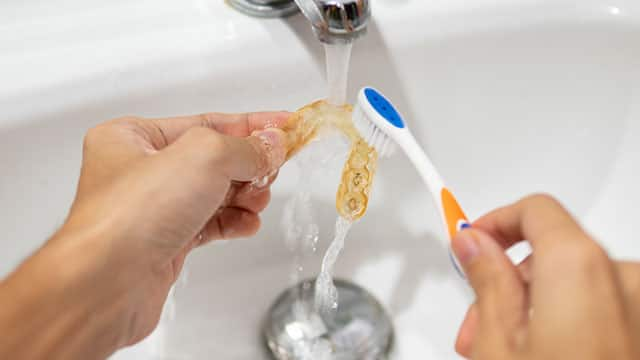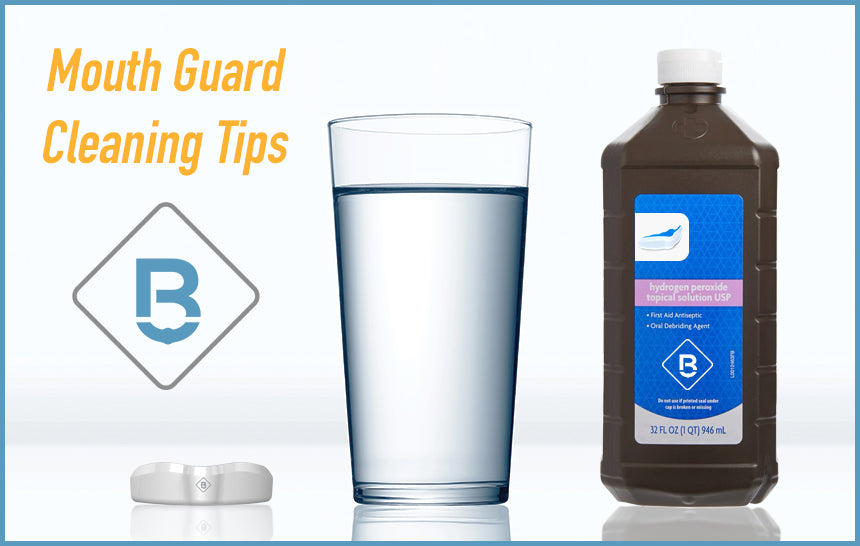Cleaning a mouth guard is essential for good oral hygiene. It keeps your mouth fresh and your guard in good condition.
Mouth guards protect your teeth, but they can become dirty quickly. Bacteria, plaque, and odors can build up if not cleaned regularly. Keeping your mouth guard clean is easy and doesn’t take much time. It’s important to know the right steps to ensure your mouth guard remains effective and hygienic.
In this guide, you will learn simple and effective methods to clean your mouth guard. These tips will help you maintain it properly, ensuring it lasts longer and keeps your mouth healthy. Ready to give your mouth guard the care it deserves? Let’s get started!

Credit: www.wikihow.com
Importance Of Cleaning Mouth Guard
Cleaning your mouth guard is essential for maintaining good oral hygiene. Mouth guards can harbor bacteria, fungi, and other harmful microorganisms. Regular cleaning helps to prevent infections and other oral health issues. It also ensures that your mouth guard remains fresh and comfortable to use.
Preventing Bacterial Build-up
Bacteria can easily accumulate on a mouth guard. This is because of the warm and moist environment inside your mouth. If not cleaned regularly, the bacteria can lead to bad breath, gum disease, and even infections.
To prevent bacterial build-up, rinse your mouth guard with cold water after each use. Additionally, use a toothbrush and mild soap to gently scrub it. Avoid using hot water as it can deform the mouth guard.
Maintaining Freshness
A clean mouth guard not only protects your oral health but also feels fresh. Over time, mouth guards can develop an unpleasant odor if not cleaned properly.
To maintain freshness, soak your mouth guard in a denture cleaner or a mixture of water and vinegar once a week. This helps to remove any lingering bacteria and keeps your mouth guard smelling fresh.
Recommended Cleaning Routine
Here is a simple cleaning routine to keep your mouth guard in top condition:
- Rinse with cold water after each use.
- Brush gently with a toothbrush and mild soap.
- Soak in denture cleaner or water-vinegar solution once a week.
Proper storage is also important for maintaining a clean mouth guard. After cleaning, store it in a ventilated case to allow it to dry completely. Avoid storing it in closed containers as this can promote bacterial growth.

Credit: www.colgate.com
Daily Cleaning Routine
Keeping your mouth guard clean is crucial for maintaining oral health. A daily cleaning routine can prevent bacteria buildup and keep your mouth guard fresh. Follow these simple steps to ensure your mouth guard stays in top condition.
Rinsing With Water
Start by rinsing your mouth guard with water. Use lukewarm water for this step. This helps to remove any loose debris or saliva. Hold the mouth guard under running water for a few seconds. Make sure all surfaces are rinsed thoroughly.
Using Mild Soap
Next, wash your mouth guard with mild soap. Use a non-abrasive soap to avoid damaging the material. Apply a small amount of soap to the mouth guard. Then, gently scrub with a soft toothbrush. Pay attention to all areas, especially the grooves and crevices. Rinse the mouth guard again with water to remove all soap residue.
Dry the mouth guard completely before storing it. Use a clean, dry towel for this. Ensure the mouth guard is completely dry to prevent bacteria growth. Store it in a ventilated case to keep it clean and safe.
Deep Cleaning Methods
Keeping your mouth guard clean is essential for oral hygiene. Deep cleaning methods ensure thorough removal of bacteria and buildup. These methods go beyond basic rinsing, providing a more comprehensive clean. Let’s explore two effective deep cleaning techniques.
Soaking Solutions
Soaking your mouth guard in a cleaning solution is simple. Fill a cup with water and add a denture cleaning tablet. Let the mouth guard soak for 15-20 minutes. This process kills bacteria and removes stains. Rinse the mouth guard with cold water after soaking. Ensure the solution covers the entire guard for best results.
Ultrasonic Cleaners
Ultrasonic cleaners use sound waves to clean your mouth guard. These devices create vibrations that remove dirt and bacteria. Fill the cleaner with water and place the mouth guard inside. Turn on the cleaner and let it run for 5-10 minutes. This method is effective for deep cleaning and ensuring your mouth guard stays fresh.

Credit: www.bruxnightguard.com
Natural Cleaning Alternatives
Maintaining a clean mouth guard is essential for oral hygiene. While commercial cleaning products are available, natural cleaning alternatives can be just as effective. These methods use simple, household ingredients to keep your mouth guard fresh and free from bacteria.
Vinegar And Water Solution
Vinegar is a natural disinfectant. Mix one part white vinegar with three parts water. Soak the mouth guard in this solution for 30 minutes. Rinse thoroughly with cool water. This method helps remove bacteria and odors.
Baking Soda Paste
Baking soda can remove stains and neutralize odors. Create a paste by mixing two teaspoons of baking soda with water. Apply the paste to your mouth guard using a toothbrush. Gently scrub for a few minutes. Rinse well with cool water. This method ensures a clean and fresh mouth guard.
Avoiding Common Mistakes
Cleaning your mouth guard is essential for oral hygiene. Many make mistakes that can harm the mouth guard. Here’s how to avoid them.
Using Harsh Chemicals
Some people use strong cleaning agents. This can damage your mouth guard. Bleach and alcohol are too harsh. They can also leave harmful residues. Instead, use mild soap or toothpaste. These are gentle yet effective.
Never soak your mouth guard in hot water. High temperatures can warp it. Instead, use cool or lukewarm water. This will keep its shape intact.
Skipping Regular Cleanings
Neglecting to clean your mouth guard daily is a mistake. Bacteria and plaque build-up quickly. This can lead to oral health issues. Clean your mouth guard every day. This will prevent any harmful build-up.
Follow a simple cleaning routine:
- Rinse with cool water before and after use.
- Brush gently with mild soap or toothpaste.
- Allow it to air dry completely.
Also, store it in a clean, dry case. This helps keep it free from contaminants.
| Do | Don’t |
|---|---|
| Use mild soap or toothpaste | Use bleach or alcohol |
| Rinse before and after use | Soak in hot water |
| Brush gently | Skip daily cleanings |
Following these tips ensures your mouth guard stays clean and effective.
Storage Tips
Storing your mouth guard properly is crucial for its longevity and hygiene. Improper storage can lead to bacterial buildup, unpleasant odors, and even damage. Follow these storage tips to ensure your mouth guard stays clean and effective.
Proper Drying Techniques
Drying your mouth guard thoroughly before storage is essential. Bacteria thrive in moist environments. After cleaning, shake off excess water. Then, place it on a clean, dry towel. Allow it to air dry completely. Avoid direct sunlight or heat sources. These can warp or damage the material.
Choosing The Right Container
A proper container keeps your mouth guard safe and clean. Use a ventilated case designed for mouth guards. Ventilation helps prevent moisture buildup. Avoid using sealed plastic bags. They trap moisture and promote bacterial growth. Look for cases with small air holes. These allow for proper air circulation.
Clean the container regularly. Use warm soapy water and a clean cloth. Rinse and dry it thoroughly before placing your mouth guard inside. A clean container ensures your mouth guard remains hygienic.
When To Replace Your Mouth Guard
Cleaning your mouth guard is essential for maintaining oral hygiene. But knowing when to replace your mouth guard is just as important. Over time, mouth guards can become less effective and even harmful if not replaced when needed.
Signs Of Wear And Tear
One of the clear indicators that it’s time to replace your mouth guard is visible signs of wear and tear. Look for the following:
- Cracks or splits in the material
- Thinning areas or holes
- Changes in shape or fit
- Discoloration
These signs indicate that the mouth guard is no longer providing the protection it should. A damaged mouth guard can also harbor bacteria, posing health risks.
Hygiene Considerations
Hygiene is another crucial factor. Even with regular cleaning, mouth guards can accumulate bacteria over time. Consider replacing your mouth guard if:
- It has an unpleasant odor that won’t go away
- It feels sticky or rough even after cleaning
- You’ve had it for more than a year, especially for night guards
- You’ve recently been sick
Regular replacement helps maintain proper oral hygiene and reduces the risk of infections.
Professional Cleaning Services
Maintaining a mouth guard can be time-consuming. Professional cleaning services offer a convenient solution. These services ensure your mouth guard is clean, safe, and comfortable to use.
When To Seek Professional Help
Knowing when to seek professional help is key. If your mouth guard has a persistent odor or visible stains, it’s time. Also, if you experience an allergic reaction, consult a professional. Regular professional cleaning ensures your mouth guard remains hygienic.
Benefits Of Professional Cleaning
Choosing professional cleaning services offers many benefits:
- Thorough cleaning using specialized equipment.
- Prolongs the life of your mouth guard.
- Removes bacteria and germs effectively.
- Prevents discoloration and bad odor.
- Saves time and effort.
Professional services ensure your mouth guard is cleaned with care. This prevents any damage and maintains its effectiveness.
| Professional Cleaning Benefits | Details |
|---|---|
| Thorough Cleaning | Uses advanced equipment for deep cleaning. |
| Prolongs Life | Prevents wear and tear, extending usage. |
| Removes Germs | Ensures bacteria-free mouth guard. |
| Prevents Odor | Removes sources of bad smells. |
| Saves Time | Professional services are quick and efficient. |
Investing in professional cleaning services keeps your mouth guard in top condition. This ensures your oral health remains uncompromised.
Frequently Asked Questions
How Often Should You Clean A Mouth Guard?
Clean your mouth guard after every use. This prevents bacteria buildup and keeps it fresh.
What Is The Best Way To Clean A Mouth Guard?
Use mild soap and water. Scrub gently with a toothbrush. Rinse thoroughly.
Can You Clean A Mouth Guard With Toothpaste?
Avoid using toothpaste. It can be abrasive and damage the mouth guard material.
How Do You Disinfect A Mouth Guard?
Soak the mouth guard in a mixture of water and vinegar for 30 minutes. Rinse well.
Is It Safe To Use Mouthwash To Clean A Mouth Guard?
Yes, but use alcohol-free mouthwash. Alcohol can degrade the material over time.
Conclusion
Keeping your mouth guard clean is essential for oral health. Regular cleaning prevents bacteria build-up. Use mild soap and a toothbrush for best results. Dry your mouth guard thoroughly before storing it. Store it in a ventilated case. Replace it when it shows wear.
Follow these steps to ensure a fresh, safe mouth guard. Your smile will thank you!
